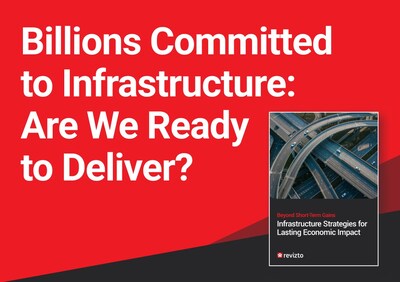
“Revizto publishes new white paper, Beyond Short-Term Gains: Infrastructure Strategies for Lasting Economic Impact”
LAUSANNE, Switzerland, Sept. 23, 2025 /PRNewswire/ — Political instability, fragile supply chains, and outdated delivery models are jeopardizing infrastructure projects critical to economic growth, according to insights from senior leaders behind some of the world’s most ambitious projects, including Heathrow, JFK, and Network Rail.
Global analysis highlights the scale of the challenge. The World Bank estimates that nine in 10 major projects face delays or cost overruns, while McKinsey puts the cost of inefficiencies at $1.6 trillion annually, with a third of that in the U.S. With demand for infrastructure investment projected by the G20 to reach $94 trillion by 2040, leaders stress that systemic change is urgent.
New insights from Revizto, a leading integrated collaboration platform used across architecture, engineering, and construction, suggest that without better coordination, delays, cost overruns, and disruptions are likely to increase. To deliver mega projects on time and on budget, leaders are calling on governments, industry, and operators to commit to longer-term planning, adopt standardized delivery models, reinforce supply chains, and accelerate the use of digital tools across infrastructure projects globally.
Top five issues identified by the research:
- Political and financial risk: Shifting policies and changing priorities are among the biggest threats to project delivery. Long-term, stable government backing is critical for success.
- Lack of standardization: Inconsistent design and delivery approaches create costly inefficiencies and rework. While every community and landscape has unique needs, adopting more standardized systems – as seen across transport infrastructure in countries like France and Germany – would help to streamline planning and execution, provided there’s room for local adaptation to ensure these projects meet people’s needs.
- Outdated practices: Slow adoption of digital tools, AI, and robotics limits collaboration and efficiency. Scaling up these technologies would cut waste, improve safety, and accelerate delivery.
- Fragile supply chains: Geopolitical shocks and climate change expose the vulnerability of global supply chains. Building resilient, localized, and diversified networks, with sustainable materials sourced closer to home, can offset these risks.
- Fragmented collaboration: Competing incentives and piecemeal delivery models slow progress. Shared risk partnerships, transparent processes, and seamless data sharing are essential to drive better outcomes.
When asked about the biggest barriers to getting infrastructure projects approved more quickly, former UK Rail Minister Chris Heaton-Harris pointed to “constantly changing decision-making, constant spec changes, and bad planning law” as the key obstacles.
Reflecting on how he kept teams aligned during major rail projects, the former Minister emphasized the importance of transparency and engaging directly with frontline workers: “I think just asking questions makes people more transparent. I used to visit some of these places – especially where there were big delays – just to talk to the people on the ground as to what they [the delays] were, and invariably, there was something higher up. It had nothing to do with the guys on the ground. It was a planning issue, or it was a change in specification that had created absolute havoc,” he added.
Tony Caccavone, who is leading the construction of JFK Airport Terminal One, stressed that alignment with government is essential for a project’s success: “You need a bit of seed money to get the project moving, to get it developed to a certain level. But at the end of the day, you also need government policies to support, to enable investors to put more money in.”
Matt Palmer, Executive Director for the Lower Thames Crossing, highlighted the importance of delivering local community impact for maintaining political buy-in: “The rise of populist politics is making it all much more about local, local, local. You have to keep the focus on your local environment.”
Arman Gukasyan, CEO of Revizto, summarized the key findings: “Whether building new critical infrastructure or upgrading existing networks, it’s clear all stakeholders must commit to long-term thinking and new ways of working. That means sustained support across political cycles, standardizing design frameworks, embracing digital tools, fortifying supply chains, and deepening collaboration across stakeholders. Together, this is how we build infrastructure that lasts and unlocks economic opportunity for generations to come.”
These insights are captured in Revizto’s new white paper, Beyond Short-Term Gains: Infrastructure Strategies for Lasting Economic Impact, which distills perspectives from policymakers, designers, operators, and sustainability executives across the UK, USA, EU, Australia, and New Zealand.
About Revizto
Revizto is the leading Integrated Collaboration Platform for the Architecture, Engineering, Construction & Operations (AECO) industry, transforming the way we design and build by driving efficiency, reducing errors, and simplifying complexity. From real-time coordination to automated clash detection and issue tracking, Revizto keeps all stakeholders aligned throughout the entire project lifecycle. Backed by Summit Partners, Revizto is relied on by firms around the world like Jacobs, AECOM, AtkinsRealis, McCarthy, Skanska, Stantec, and others to deliver projects with greater confidence and control.
View original content to download multimedia:https://www.prnewswire.com/news-releases/global-infrastructure-at-a-crossroads-leaders-identify-biggest-threats-to-project-delivery-302560706.html
SOURCE Revizto





